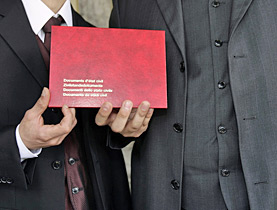
Same-sex unions mark first year

Slightly over a year after Switzerland introduced registered partnerships for gays and lesbians, around 2,000 couples have made their relationships official.
The law – which allows couples to have the same pension, inheritance and tax rights and obligations as heterosexuals – has received some praise from gay rights activists, but there are also concerns about its effects.
Moël Volken, executive director of Pink Cross – an organisation representing gay men – says the law is certainly not perfect, but legal recognition has definitely been a step forward.
“Without a partnership, same-sex couples have no rights. If you fill out a form, if your partner is ill in the hospital, there is no document saying that this person is your next-of-kin,” he told swissinfo.
So far, gay men have been far more enthusiastic to commit – they make up three quarters of the total number of partnerships.
The low number of women is a concern for Sylvie Berrut of the Swiss lesbian organisation, LOS. There were just 500 lesbian couples among the 42,000 heterosexual and homosexual couples entering a legal union in 2007.
She said that women may be reluctant to declare their sexual orientation to an employer just to receive benefits. Furthermore, they continue to earn less than men, and being saddled with higher tax rates in exchange for some legal rights makes little sense for many.
No adoption
Under the legislation, same-sex couples may not adopt children, and access to fertility treatment is prohibited.
“Many are outraged that they registered as a couple but cannot adopt children,” said Barbara Lanthemann, president of Alpagai, another gay and lesbian association.
The paradox – that a single gay person may adopt but a couple in a partnership may not – is an issue that may eventually be settled by the courts, reckons Volken.
Gays and lesbians are fighting a social stigma dating back hundreds of centuries and will always be playing a game of “legal catch-up”, according to Jean-Paul Guisan, another official with Pink Cross.
People are more open about their homosexuality these days, but it is still difficult to come out. Guisan warned that pejorative terms are still standard fare in the schoolyard, although efforts are being made by some associations to counter discrimination by working within the educational system.
Volken also said that the gay and lesbian priorities vary considerably according to people’s age.
Today’s generation is more family-oriented, he added, pointing out that young women in particular see no contradiction between same-sex relationships and having children.
The old guard – his generation – had been more concerned about winning rights than about settling down, he admitted, noting that many of his contemporaries had considered not having children as part of their gay or lesbian identity.
swissinfo, Justin Häne
In June 2005 the Swiss voted in a national referendum by 58 per cent in favour of registered same-sex partnerships.
To register their partnership, couples have to be over the age of 18, not already married or linked by a registered same-sex civil union, and not be parents. One of the two partners must be Swiss or have Swiss residence.
Same-sex couples are able to register a new partnership at any registry office. The union is recorded in front of a registry officer, but each partner does not have to say the traditional “I do”.
Foreign partners are entitled to residence permits, but the naturalisation process will not be made easier as with married couples.
Same-sex unions had already been permitted in several cantons for a number of years and have existed in Geneva since 2001.
Protestant churches in some cantons also bless gay couples but this is not done on a nationwide basis, and is not done in the Catholic Church.

In compliance with the JTI standards
More: SWI swissinfo.ch certified by the Journalism Trust Initiative

























You can find an overview of ongoing debates with our journalists here . Please join us!
If you want to start a conversation about a topic raised in this article or want to report factual errors, email us at english@swissinfo.ch.